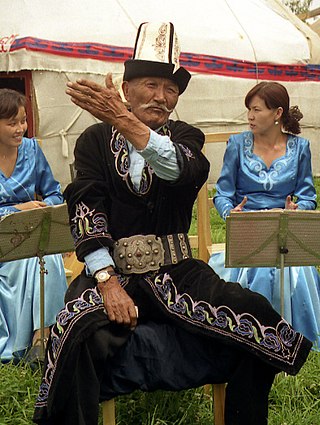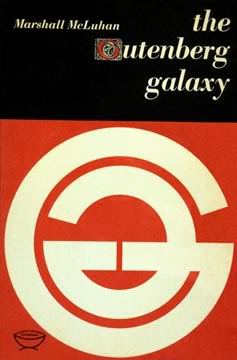
Herbert Marshall McLuhan was a Canadian philosopher whose work is among the cornerstones of the study of media theory. He studied at the University of Manitoba and the University of Cambridge. He began his teaching career as a professor of English at several universities in the United States and Canada before moving to the University of Toronto in 1946, where he remained for the rest of his life. He is known as the "father of media studies".

Oral tradition, or oral lore, is a form of human communication in which knowledge, art, ideas and culture are received, preserved, and transmitted orally from one generation to another. The transmission is through speech or song and may include folktales, ballads, chants, prose or poetry. It is a medium of communication for a society to transmit oral history, oral literature, oral law and other knowledge across generations without a writing system, or in parallel to a writing system.

Milman Parry was an American Classicist whose theories on the origin of Homer's works have revolutionized Homeric studies to such a fundamental degree that he has been described as the "Darwin of Homeric studies". In addition, he was a pioneer in the discipline of oral tradition.

A written language is the representation of a language by means of writing. This involves the use of visual symbols, known as graphemes, to represent linguistic units such as phonemes, syllables, morphemes, or words. However, written language is not merely spoken or signed language written down, though it can approximate that. Instead, it is a separate system with its own norms, structures, and stylistic conventions, and it often evolves differently than its corresponding spoken or signed language.
Word of mouth is the passing of information from person to person using oral communication, which could be as simple as telling someone the time of day. Storytelling is a common form of word-of-mouth communication where one person tells others a story about a real event or something made up. Oral tradition is cultural material and traditions transmitted by word of mouth through successive generations. Storytelling and oral tradition are forms of word of mouth that play important roles in folklore and mythology. Another example of oral communication is oral history—the recording, preservation and interpretation of historical information, based on the personal experiences and opinions of the speaker. Oral history preservation is the field that deals with the care and upkeep of oral history materials collected by word of mouth, whatever format they may be in.
Media ecology theory is the study of media, technology, and communication and how they affect human environments. The theoretical concepts were proposed by Marshall McLuhan in 1964, while the term media ecology was first formally introduced by Neil Postman in 1968.

Oral literature, orature, or folk literature is a genre of literature that is spoken or sung in contrast to that which is written, though much oral literature has been transcribed. There is no standard definition, as anthropologists have used varying descriptions for oral literature or folk literature. A broad conceptualization refers to it as literature characterized by oral transmission and the absence of any fixed form. It includes the stories, legends, and history passed through generations in a spoken form.
Secondary orality is orality that is dependent on literate culture and the existence of writing, such as a television anchor reading the news or radio. While it exists in sound, it does not have the features of primary orality because it presumes and rests upon literate thought and expression, and may even be people reading written material. Thus, secondary orality is usually not as repetitive, redundant, agonistic, etc. the way primary orality is, and cultures that have a lot of secondary orality are not necessarily similar to primarily oral cultures. Secondary orality should not be confused with "oral residue" in which a culture has not fully transitioned to literate / written culture and retains many of the characteristics of primary oral cultures. Secondary orality is a phenomenon of post-literacy, whereas oral residue is a stage in the transition from pre-literate to literate.

The Gutenberg Galaxy: The Making of Typographic Man is a 1962 book by Marshall McLuhan, in which he analyzes the effects of mass media, especially the printing press, on European culture and human consciousness. It popularized the term global village, which refers to the idea that mass communication allows a village-like mindset to apply to the entire world; and Gutenberg Galaxy, which we may regard today to refer to the accumulated body of recorded works of human art and knowledge, especially books.

Walter Jackson Ong was an American Jesuit priest, professor of English literature, cultural and religious historian, and philosopher. His major interest was in exploring how the transition from orality to literacy influenced culture and changed human consciousness. In 1978 he served as elected president of the Modern Language Association.
A post-literate society is a hypothetical society in which multimedia technology has advanced to the point where literacy, the ability to read or write, is no longer necessary or common. The term appears as early as 1962 in Marshall McLuhan's The Gutenberg Galaxy. Many science-fiction societies are post-literate, as in Ray Bradbury's Fahrenheit 451, Dan Simmons' novel Ilium, and Gary Shteyngart's Super Sad True Love Story.
Print culture embodies all forms of printed text and other printed forms of visual communication. One prominent scholar of print culture in Europe is Elizabeth Eisenstein, who contrasted the print culture of Europe in the centuries after the advent of the Western printing-press to European scribal culture. The invention of woodblock printing in China almost a thousand years prior and then the consequent Chinese invention of moveable type in 1040 had very different consequences for the formation of print culture in Asia. The development of printing, like the development of writing itself, had profound effects on human societies and knowledge. "Print culture" refers to the cultural products of the printing transformation.

The Homeric Question concerns the doubts and consequent debate over the identity of Homer, the authorship of the Iliad and Odyssey, and their historicity. The subject has its roots in classical antiquity and the scholarship of the Hellenistic period, but has flourished among Homeric scholars of the 19th, 20th, and 21st centuries.

Eric Alfred Havelock was a British classicist who spent most of his life in Canada and the United States. He was a professor at the University of Toronto and was active in the Canadian socialist movement during the 1930s. In the 1960s and 1970s, he served as chair of the classics departments at both Harvard and Yale. Although he was trained in the turn-of-the-20th-century Oxbridge tradition of classical studies, which saw Greek intellectual history as an unbroken chain of related ideas, Havelock broke radically with his own teachers and proposed an entirely new model for understanding the classical world, based on a sharp division between literature of the 6th and 5th centuries BC on the one hand, and that of the 4th on the other.
Oral poetry is a form of poetry that is composed and transmitted without the aid of writing. The complex relationships between written and spoken literature in some societies can make this definition hard to maintain.
In modern usage, the term grammatology refers to the scientific study of writing systems or scripts. This usage was first elucidated in English by linguist Ignace Gelb in his 1952 book A Study of Writing. The equivalent word is recorded in German and French use long before then. Grammatology can examine the typology of scripts, the analysis of the structural properties of scripts, and the relationship between written and spoken language. In its broadest sense, some scholars also include the study of literacy in grammatology and, indeed, the impact of writing on philosophy, religion, science, administration and other aspects of the organization of society. Historian Bruce Trigger associates grammatology with cultural evolution.
The alphabet effect is a group of hypotheses in communication theory arguing that phonetic writing, and alphabetic scripts in particular, have served to promote and encourage the cognitive skills of abstraction, analysis, coding, decoding, and classification. Promoters of these hypotheses are associated with the Toronto School of Communication, such as Marshall McLuhan, Harold Innis, Walter Ong, Vilém Flusser and more recently Robert K. Logan; the term "alphabet effect" comes from Logan's 1986 work.

Oral-formulaic composition is a theory that originated in the scholarly study of epic poetry and developed in the second quarter of the twentieth century. It seeks to explain two related issues:
- the process by which oral poets improvise poetry
- the reasons for orally improvised poetry having the characteristics that it does
The Toronto School is a school of thought in communication theory and literary criticism, the principles of which were developed chiefly by scholars at the University of Toronto. It is characterized by exploration of Ancient Greek literature and the theoretical view that communication systems create psychological and social states. The school originated from the works of Eric A. Havelock and Harold Innis in the 1930s, and grew to prominence with the contributions of Edmund Snow Carpenter, Northrop Frye and Marshall McLuhan.
David Richard Olson is a Canadian cognitive developmental psychologist who has studied the development of language, literacy, and cognition, particularly the mental lives of children, their understanding of language and mind and the psychology of teaching. Olson is University Professor Emeritus at the Ontario Institute for Studies in Education at the University of Toronto, where he has taught since 1966.

![Socrates in Plato's Phaedrus, quoting the prophecy of Ammon (Thamus) : "[Writing] will produce forgetfulness in the minds of those who learn to use it, because they will not practice their memory. [..] You have invented an elixir not of memory, but of reminding; and you offer your pupils the appearance of wisdom, not true wisdom.." (trans. H.N. Fowler; Line 275) Socrates Louvre.jpg](http://upload.wikimedia.org/wikipedia/commons/thumb/a/a4/Socrates_Louvre.jpg/170px-Socrates_Louvre.jpg)









